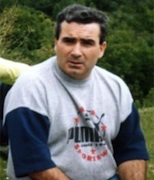
A recording of a telephone conversation with a former British army General Officer Commanding in the north appears to confirm allegations that Belfast man Freddie Scappaticci was the infamous British double-agent known as ‘Steak-Knife’ or ‘Stakeknife’.
The conversation between a man describing himself as Channel 4 journalist ‘Jeremy Giles’ and General John Wilsey appeared on the internet through a ‘Stakeknife’ blog.
In a lengthy conversation peppered with British military jargon, the former five-star general openly and repeatedly refers to Scappaticci as the former British agent, and discusses a meeting he had with the agent in south Belfast.
‘Stakeknife’, a British agent working at the top of the Provisional IRA’s internal security unit, was connected to the brutal torture and murder of a number of republicans through the late eighties and nineties.
Wilsey said he met the agent in 1993 to reassure him because he had become unnerved by London police chief John Stevens’s inquiries into collusion in the north of Ireland.
“The head of the intelligence in Northern Ireland came to see me and said [Lord] Stevens was burrowing around and that Fred Scappaticci.. whatever his name was, was unsettled and would I go and see him and reassure him as to the value of his work and that’s what I did,” he said.
“He was outed by Stevens wasn’t he? I thought it was a most unprofessional business,”
The general said he met Scappaticci alone, saying “he was our best agent, as you know... I did reassure him”.
The former officer, who was British Army commander in Ireland from 1990 to 1993, wrote a book on his experiences.
When asked why he had not discussed the importance of ‘Stakeknife’ in his book he said it was because the agent “was the golden egg, it was the one thing that was terribly, terribly important to the army, so we never, ever mentioned the word Stakeknife or what he subsequently became”.
He added that the RUC police “wanted to get him off us. They wanted to run him themselves. As I explained in the book, Fred didn’t want to go with the police because he thought they were sectarian.
He didn’t want to be handled by MI5 or MI6 because he thought they were “a whole lot of university poofters and so on”.
“He was our most important secret,” Wilsey added. “He was a golden egg, something that was very important to the Army. We were terribly cagey about Fred.”
He also revealed that Stakeknife was recruited as an agent in 1976 and that his first handler was a soldier named Peter Jones. In 1984, a specialist agent-handling unit called the Force Research Unit (FRU) was set up and both Jones and Scappaticci were attached to it.
“The FRU worked for [both] MI5 and the RUC and all the [intelligence] went to them,” he said.
“I was responsible only for administering them and promoting them. They were a force unit, not my unit. Not operationally,” the former general said.
In 2003, following the original accusations, Scappaticci received the support of the Sinn Féin leadership before conducting an extensive interview with the local Andersonstown News newspaper in Belfast to challenge the claims. However, his denials were never believed and he was forced to flee.
He was later reported to have been spirited out of Ireland by MI5 and to have undergone facial reconstruction surgery. His current whereabouts remain unknown.
In his public statements, Scappaticci has continued to deny that he is ‘Stakeknife’ or ever working as a British agent.
INQUIRY LINK
Details of the taped conversation with Wilsey emerged as the Smithwick Tribunal in Dublin, which is examining the IRA ambush on RUC Chief Superintendent Harry Breen and Superintendent Bob Buchanan in south Armagh in 1989, considered the possible involvement of British double-agents in the attack.
The inquiry was set up to investigate the deaths of the two most senior RUC men killed during the conflict as a concession to unionists, following allegations of collusion between the IRA and the 26-County Garda police.
Former British Army intelligence handler Ian Hurst, also known as ‘Martin Ingram’, testified to the inquiry behind closed doors this week, for secrecy reasons.
In his evidence, Hurst said that up to four members of the IRA unit that ambushed the two senior RUC men could have been British agents. Hurst has suggested Freddie Scappaticci was one of these agents.
A legal representative of the British military, Lieut Col Paul Hockley, was asked to be present during Hurst’s testimony, apparently to represent its interests. He was also asked by the inquiry to assist it in censoring the transcript of its proceedings.
The final report of the Smithwick Tribunal is expected around the end of May or early June.
![[Irish Republican News]](https://republican-news.org/graphics/title_gifs/rn.gif)
![[Irish Republican News]](https://republican-news.org/graphics/title_gifs/harp.gif)

